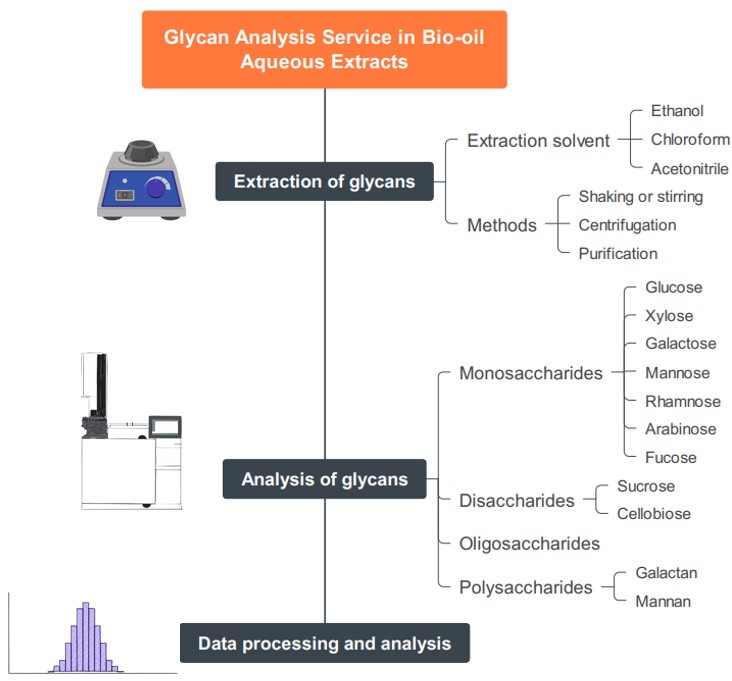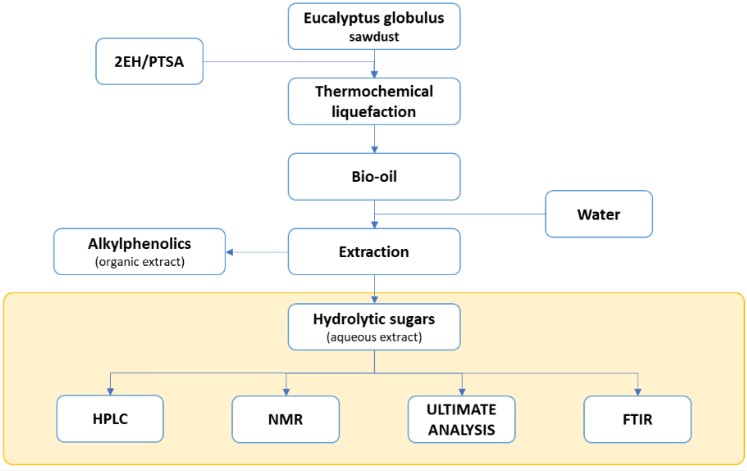Glycan Analysis Service in Bio-Oil Aqueous Extracts
Analysis of Glycans in Bio-Oil Water Extract at Creative Biolabs
Bio-oil is a complex mixture obtained during biomass pyrolysis or biomass conversion, which may contain various glycans. Glycans may affect the properties and characteristics of bio-oil, such as viscosity, stability, and solubility. The analysis of glycans can determine the type, content, and structure of polysaccharides present in it, help accurately identify the complex components of bio-oil, provide key information for the processing and utilization of bio-oil water extracts, thereby guiding the control and optimization of the production process. Creative Biolabs focuses on research in the field of sugars. Our professional team provides comprehensive glycan analysis services. We use a variety of methods to accurately detect and quantitatively analyze glycans in bio-oil water extracts.
We add an appropriate amount of extraction solvent (such as ethanol, chloroform, acetonitrile, etc.) to bio-oil water extract and promote the dissolution of glycans by shaking or stirring. The mixture is then centrifuged and the glycan sample is purified by column chromatography, gel filtration, or other purification techniques.
There are many types of sugars in bio-oil water extract, including monosaccharides (such as glucose, xylose, galactose, mannose, rhamnose, arabinose, fucose), disaccharides (such as sucrose, cellobiose), oligosaccharides and polysaccharides (such as galactan, mannan). These sugars have an important impact on the properties and uses of bio-oil. We use a variety of methods to detect sugars in bio-oil water extract, including chromatography, mass spectrometry, spectroscopy, etc. These methods determine the different types of sugars present in the sample and quantify their content.
-
Monosaccharide analysis: The common monosaccharide analysis standard is to use a mixture containing various known monosaccharides to construct a standard curve, and then use chromatography (such as high-performance liquid chromatography) to separate and detect various monosaccharides to determine their types and contents.
-
Oligosaccharide and polysaccharide analysis: We will decompose oligosaccharides and polysaccharides into smaller monosaccharide units according to the actual situation of the sample, and then perform qualitative and quantitative analysis.
-
Data processing and analysis
We process and statistically analyze the experimental data to provide a comprehensive understanding of the detailed information on the composition and content of sugars in the water extract of bio-oil. These data help to gain a deeper understanding of the chemical properties of the water extract of bio-oil and provide basic support for its subsequent processing and utilization.

Creative Biolabs has extensive experience and expertise to accurately analyze various glycan components in water extracts of bio-oil. In addition, for Bio-Oils, we also provide Semi-Volatile Oxygenated Components Analysis services. Please contact us if you are interested in learning more about our analysis process, and we will respond to your needs promptly.
Published data
Eucalyptus globulus is a major raw material in the pulp and paper industry, and its residues are converted into fuels and carbon sources through chemical processes such as thermochemical liquefaction. The sugars produced in the aqueous phase of bio-oil during the liquefaction process are used in industry to provide support for the acquisition of sustainable materials with added economic value. The authors used an efficient, rapid, and accurate method to successfully identify and quantify the sugar content and composition of the water extract of bio-oil produced by Eucalyptus globulus liquefaction using high-performance liquid chromatography and refractive index detector (RID). Moreover, the components were characterized by infrared, nuclear magnetic resonance, and other technologies. The results showed that the water extract of bio-oil contained different proportions of glucose, fructose, sucrose, xylose, and trehalose. This study provided data on the content of various sugars in bio-oil extracts, providing strong support for further use of these sugars in the process.
 Fig.1 Flowchart of glycan analysis in aqueous extracts of bio-oils.1, 2
Fig.1 Flowchart of glycan analysis in aqueous extracts of bio-oils.1, 2
FAQs
Q1: What types of samples do you analyze for?
A1: Our analysis services apply to various types of bio-oil aqueous extract samples, including but not limited to samples from different sources.
Q2: How long does your analysis take? Do you provide fast reports?
A2: The analysis time varies depending on the number and complexity of samples, usually a few days to a few weeks. We strive to ensure an efficient analysis process and provide expedited services to obtain fast reports according to client needs.
Q3: Can you explain the analysis results to help me understand the sugar content and structure in the sample?
A3: Yes, our professional team will interpret the analysis results in detail and explain to you the content ratio, connection method, and structural characteristics of different sugars in the sample so that you better understand and use this information.
Customer Review
Provide Detailed Glycan Composition Analysis Report
"I am impressed by the thoroughness of the glycan analysis provided by the Creative Biolabs team. The detailed report helped us understand the complex sugar composition in our bio-oil extract."
Excellent Glycan Analysis Service
"Overall, an exceptional experience working with the Creative Biolabs team for glycan analysis in bio-oil aqueous extracts. Their expertise, reliability, and dedication make them a preferred choice for any future analytical needs."
References
-
Silva, Luciana, et al. "Quantification of Hydrolytic Sugars from Eucalyptus globulus Bio-Oil Aqueous Solution after Thermochemical Liquefaction." Forests 14.4 (2023): 799.
-
Under Open Access license CC BY 4.0, without modification.
For Research Use Only.
Related Services


 Fig.1 Flowchart of glycan analysis in aqueous extracts of bio-oils.1, 2
Fig.1 Flowchart of glycan analysis in aqueous extracts of bio-oils.1, 2

